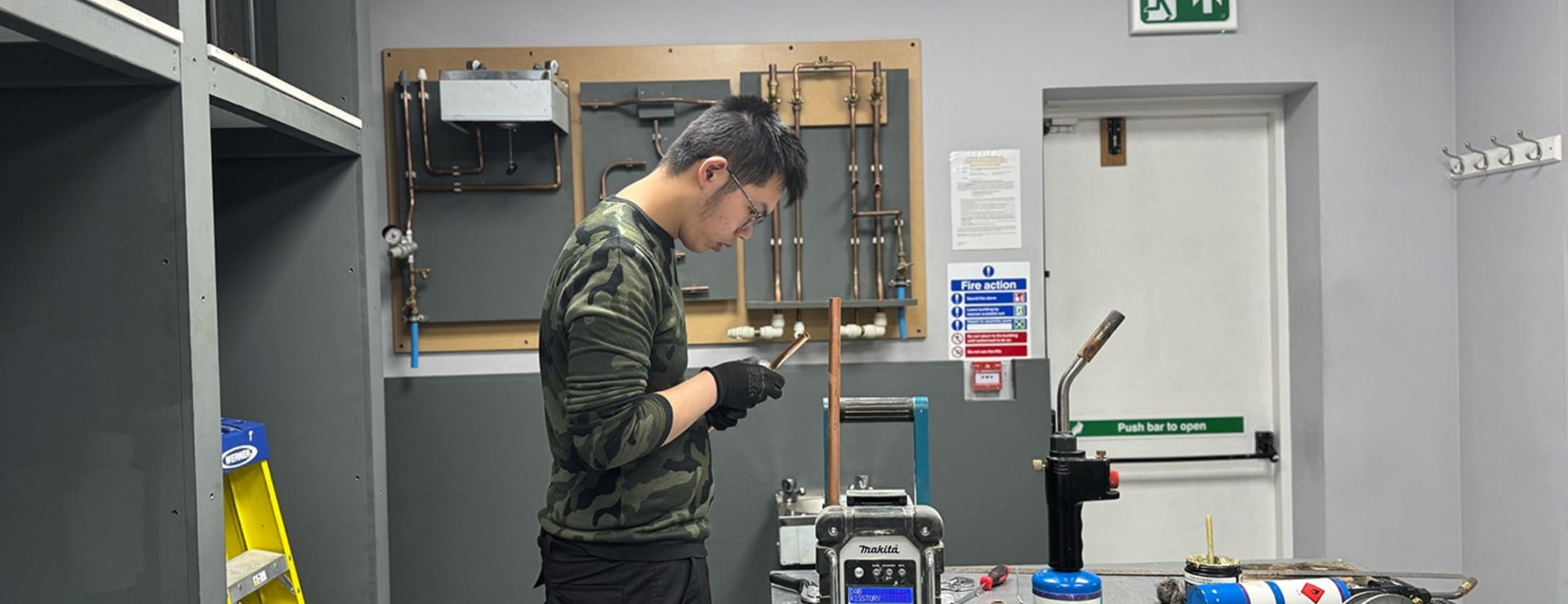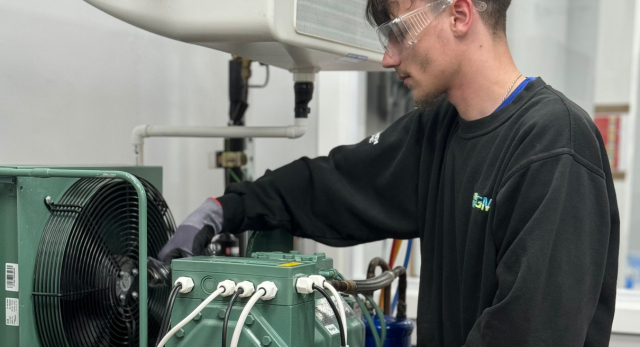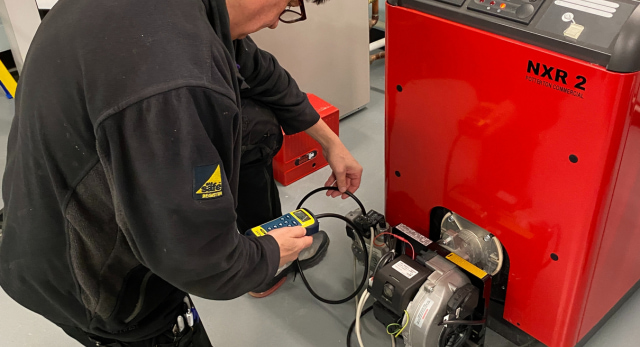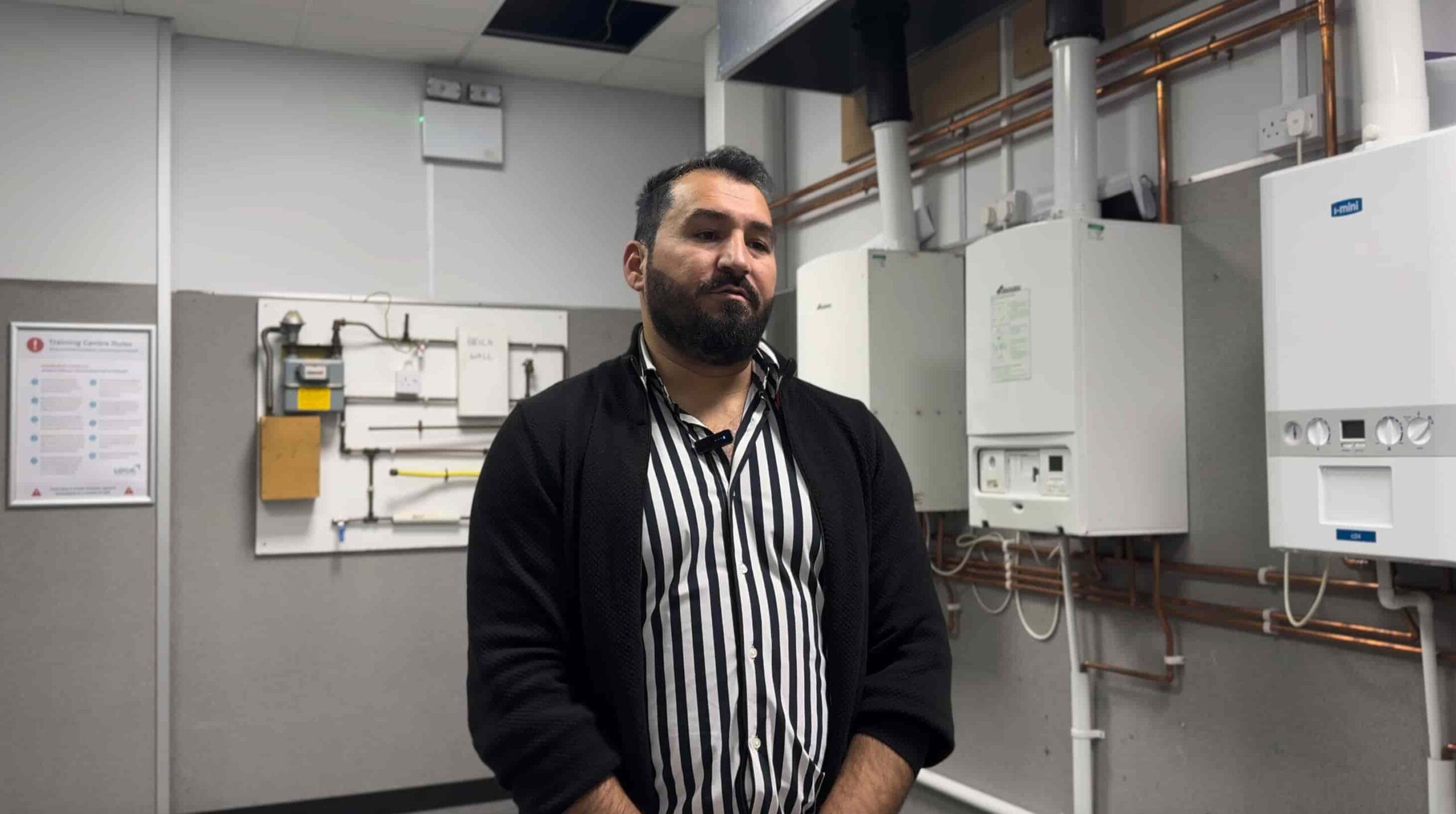Do you go to university or jump straight into the world of trades? In 2025, this question is more relevant than ever, especially with the rise of artificial intelligence (AI) making it even more urgent. University still has its place, but the trades are making a comeback.

Which Is Right for You?
Here’s a quick comparison to help you to quickly understand the differences.
| Factor | University | Trades |
|---|---|---|
| Cost | £9000+ (fees, living expenses, debt) | Courses from £2995 or apprenticeships are free |
| Time to Qualify | 3+ years | 6 months – 3 years (courses, apprenticeships) |
| Earning Potential | Slow start, can be high in some fields | Fast start, high ceiling in many trades |
| Job Security | Variable, some grad oversupply, AI displacement | High, skills shortage in UK, safe from AI |
| Flexibility | Less flexible | Courses/apprenticeships to suit your schedule |
| Career Progression | Grad schemes, further study | Upskill, specialise, go self-employed, management |
| Practical Experience | Limited (unless you do a placement) | Core part of training |
Why This Debate Still Matters
The “trades vs uni” debate isn’t just about education. It’s about your life, your career, and your happiness. With the cost of living rising and the skills shortage in the UK showing no signs of slowing, more people are questioning the “default” university route. Meanwhile, the demand for skilled tradespeople like plumbers, electricians, gas engineers, and renewable energy engineers is at an all-time high.
But here’s the twist for 2025. AI is shaking up the job market, and not always in the way you’d expect. “White-collar”, office-based jobs, once thought to be safe, are now under threat from automation and AI. In contrast, the trades are proving to be some of the safest and most future-proof careers out there.
At Logic4training, we’ve spent over 20 years helping people like you build successful careers in the trades. We know what works, what pays, and what gives you real job security, even in the age of AI.
The University Route
University has long been seen as the traditional path to a successful career. For many, it’s a chance to dive deep into academic subjects, build a professional network, and enjoy the famous “student experience.” With hundreds of courses and career options, university can open doors to professions that require a degree such as law, medicine, or engineering. However, in 2025, the world of work is changing fast. The rise of AI is reshaping many graduate jobs, and the cost of higher education is higher than ever. Let’s take a closer look at the pros and cons of going to university.
The Pros
- Academic Depth: Going to university gives you access to specialist knowledge, research, and academic networks.
- Social Life: Uni is famous for its social scene, societies, and the “student experience.”
- Career Doors: Some professions (think medicine, law, engineering) require a degree.
- Personal Growth: Living away from home, managing your own time and money, and meeting people from all walks of life.
The Cons
- Debt: The average student leaves with over £45,000 in debt. That’s a heavy load to carry into your twenties.
- Uncertain Job Prospects: A degree no longer guarantees a job. Many grads end up in roles unrelated to their studies.
- AI Impact: Entry-level white-collar jobs are now at risk of being automated by AI. Experts warn that up to 50% of these jobs could disappear in the next five years, making it harder for graduates to get a foot in the door.
- Delayed Earnings: You’re not earning real money until you finish, usually three years minimum.
The Trades Route
The trades route is all about practical skills, hands-on learning, and getting into the workforce quickly. Whether you’re interested in plumbing, electrical work, gas engineering, or renewables, the trades offer a direct path to a rewarding, well-paid career. Apprenticeships and vocational courses mean you can earn while you learn, avoid massive student debt, and gain real-world experience from day one. In a world where AI is automating many office jobs, the trades stand out as one of the safest and most future-proof career choices. Here’s what you need to know about the pros and cons of choosing the trades.
The Pros
- Earn While You Learn: Apprenticeships and training courses mean you start making money from day one.
- Job Security: The UK desperately needs skilled tradespeople. You’ll be in demand.
- No Massive Debt: Training costs are a fraction of university fees, and you’ll avoid the student loan trap.
- AI-Proof: The hands-on, problem-solving nature of trades makes them some of the safest jobs from AI automation. These roles require dexterity, on-the-spot decision-making, and real-world adaptability that machines simply can’t replicate.
- Variety: Every day is different. One day you’re fixing a boiler, the next you’re installing a heat pump.
- Progression: With the right qualifications, you can run your own business, specialise in renewables, or move into management.
The Cons
- Physical Work: Trades can be physically demanding. Think early starts, manual labour, and working in all weathers.
- Upfront Commitment: You’ll need to get qualified and keep your skills up to date.
- Perception: Some people still see trades as “lesser” than academic routes. (Spoiler: they’re wrong.)
As more people recognise the value of hands-on experience and real earning potential, trades training courses and apprenticeships are becoming the go-to alternative for those who want a secure and rewarding future. This shift is happening at a time when the world of work is changing rapidly, and the trades are standing out as one of the safest and most future-proof choices.
So, what’s driving this change in 2025? Let’s take a closer look at the forces shaping the job market right now and why skilled trades are more in demand than ever.

What’s Changed in 2025?
The world of work is shifting fast in 2025. From the rise of AI to a growing skills shortage, several major changes are shaping the future of careers—and making the trades more appealing and secure than ever. Here are the 3 key changes that we at Logic4training have seen change:
- Skills Shortage: The demand for tradespeople is high. The UK government and industry bodies are pushing for more skilled workers and upskilling in areas like renewables, smart meters, and heat pumps.
- AI Impact: The rise of AI is accelerating the decline of routine office jobs, making the security of skilled trades even more attractive.
- Apprenticeships for All Ages: It’s not just for school leavers. Our apprenticeships are open to anyone 19+ looking to retrain or upskill.
AI is The Game Changer in 2025
AI is already reshaping the job market. Entry-level white-collar jobs, long seen as a safe bet for uni grads, are now at risk. AI systems are taking over tasks in finance, law, tech, journalism, and customer service. Experts predict that up to half of all entry-level white-collar jobs could be replaced by AI in the next five years, with unemployment in these sectors potentially spiking to 20%.
Even high-paying, degree-requiring roles are no longer immune. AI can write reports, analyse data, draft legal documents, and even create content, putting pressure on jobs that once felt untouchable.
Why the Trades Are Safe
Here’s the good news: skilled trades are among the most AI-resistant careers out there. Why? Because they require:
- Hands-on expertise
- Problem-solving in real time
- Physical dexterity
- Adaptability to unique environments
AI can help with planning or diagnostics, but it can’t crawl under a sink, rewire a house, or install a heat pump. The nuanced, practical skills of a tradesperson remain irreplaceable. Our article on AI job losses and why tradespeople are safe from AI provides more in-depth information, should you be looking for further details.
What About Career Progression?
When it comes to moving up the career ladder, the trades offer distinct advantages compared to many traditional office-based or white-collar roles, especially in today’s rapidly changing job market.
Progression in the trades is often faster, more flexible, and more financially rewarding than in many office-based careers. With the added benefit of being largely protected from the disruption caused by AI and automation, the trades offer a future-proof path for those who want to take control of their careers and earning power. Whether you’re just starting out or looking to take your skills to the next level, the opportunities for progression are diverse and exciting.
Upskill with Specialist Training
The trades are constantly evolving, especially with the rise of green technologies and smart systems. Upskilling is key! Consider options such as heat pump installation, EV charging, smart meters, or advanced diagnostics. Diversifying your skill set means you can take on more complex jobs, command higher rates, and stay ahead of the competition.
Go Self-Employed or Start Your Own Business
One of the biggest draws of a trade career is the chance to be your own boss. Many tradespeople choose self-employment, setting their own hours, picking their clients, and controlling their earnings. The journey to self-employment varies. Some jump in straight after qualifying, while others build up experience and a client base over several years. Either way, it will require dedication to building your brand and company, but it brings the rewards of being your own boss. Independence, flexibility, and the potential for much higher income.
Move into Management, Teaching, or Consultancy
With experience, tradespeople can progress into supervisory roles, project management, or even start teaching the next generation of skilled workers. Some move into technical consultancy, advising on complex projects or helping companies stay compliant with regulations. The leadership and specialist skills you develop can take you far beyond the tools.
Embrace New Tech and Sustainability
The future of the trades is being shaped by technology and sustainability. From augmented reality for project planning to green building practices and renewable energy installations, those who embrace change will find themselves in high demand. Continuous learning ensures you stay at the cutting edge and future-proof your career.
Earning Potentials
Trades
The typical starting wage in the building services sector is around £26,000. Tradespeople earn more earlier compared to university graduates. At the age of 22, one of our trainees, Ryan had earned enough from his plumbing career to buy his own house. “Not many of my schoolmates who went to university are in the same position,” he says. “It’s hard to see them now, saddled with large debts, finding it difficult to find work and ending up working back at Tesco’s.” Read more: Ryan’s story. Experienced plumbing, heating and electrical engineers can earn between £30,000 – £50,000 a year, and if you grow your own business, the sky’s the limit.
See what those who have trained with us earn in our 2025 surveys on earnings.
University
Potential for very high earnings, depending on specialism and sector. The typical graduate scheme wage is around £24,000. Graduates can expect to earn a living wage by the age of 29, compared to 22 for tradespeople.
Where To Go From Here?
Ready to take the plunge? Here’s what to do next:
- Research Your Options: Explore your university options or check out new entrants courses and apprenticeships for plumbing, gas, electrical, and renewables. Don’t know what trade is best to learn?
- Choose Your Path: Decide if the trades or university is better for you and your career.
- Get Qualified: Complete your trades training or university degree.
- Start Earning: Apply for roles depending on the route of /training or study you took. Many of our students land jobs or start earning as soon as they finish their training.
Why Choose Logic4training?
- Expertise: Over 20 years’ experience training the UK’s best tradespeople.
- Industry Connections: We work with employers, industry bodies, and government to keep our training up to date.
- Flexible Learning: Courses to fit your life. We offer weekday and weekend options for our courses and run our apprenticeships with a block release method.
- Support: From your first enquiry to your first job, we’re with you all the way.
- Future-Proof Skills: Our courses cover the latest in renewables, smart tech, and energy efficiency.
Check out our full course list and see what’s possible for your future.
Final Thoughts
There’s no one-size-fits-all answer. University is right for some, trades for others. But in 2025, the trades offer a real, respected, and rewarding alternative with less debt, more job security, and the chance to shape the future. And as AI transforms the world of work, skilled trades are proving to be some of the safest, most future-proof careers you can choose.
If you want to learn more, talk to us at Logic4training. We’re here to help you find your path, whether you’re 18 or 48, starting out or starting over.
Ready to make your move? Contact us and let’s get started.









